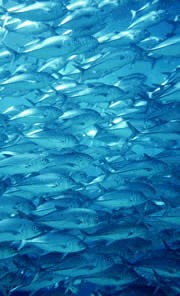|
The netting of the biggest fish — many of which, such as cod and hake, eat their own species — is probably allowing more small fish to survive, says Daan. Fish species that never grow larger than 30 cm are also increasingly abundant. "Fishing has affected the community to the degree that the entire species composition is changing," adds Daan.
Daan and colleagues scrutinized the catch of dozens of species in trawl data going back 30 years from the North Sea. Surrounded by Britain, Iceland and Scandinavia, the North Sea contains more than 200 species of fish and is one of the world's most productive fisheries. Most surveys of the area look at just seven or so commercially important species, so have missed the trend.
The finding is the first clear demonstration of fishing's knock-on effects, says Jake Rice of Canada's Department of Fisheries and Oceans in Ottawa — that it alters the size and type of remaining fish, not just their number. "It was only speculation until this point," says Rice.
But it will be difficult to know what Daan's findings mean for stocks until there is more investigation of fishing's effects on ecosystems, rather than on just the availability of commercially important fish. "It's a pretty unambiguous demonstration, we're just not quite sure what it means yet," says Rice.
Climate change may be a complicating factor, for example. Southern species are suspected to be increasingly present in the gradually warming North Sea. Such migration could eventually influence fish communities as much as fishing.
“We're not quite sure what it means” - Jake Rice Department of Fisheries and Oceans, Canada
Understanding the ecological effects of fishing is crucial if governments are to manage remaining fish stocks effectively. "If a fish community has changed in a particular direction it might be very difficult to recover its position," says Daan.
Such upheavals could explain why it's so hard to undo the damage caused by overfishing. Researchers at the meeting will also see new data on how cod fisheries in Canada are yet to recover despite a decade-long ban on fishing.
Top
|
